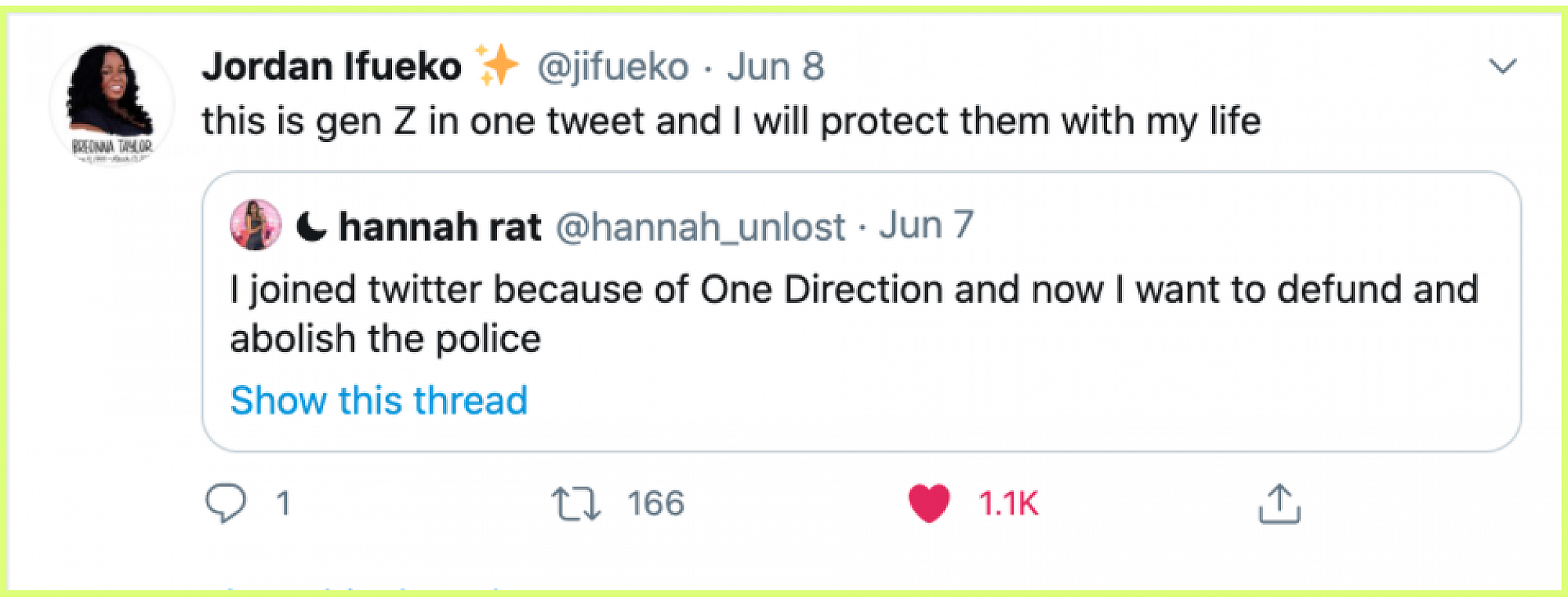Ask Gen Z: Mid-Year Trend Report

2020 has been a whirlwind year in every sense of the word. From a global pandemic to an unprecedented civil rights movement, both our world and digital landscape has changed drastically. The events of the last six months will have immense ramifications for generations to come, and no generation will be impacted more than Gen Z. We’ve seen trends that were taking shape prior to this moment — ones that usually take place over the course of five years, occurred over the course of mere months. As we look back on the generation-changing last six months, these are some of the key forces guiding youth culture today.
Activism
Amid a confluence of crises, Gen Z is saying enough is enough. Gen Zers are committed to making the world a better place. They are labeled the “action generation” for a reason, stepping up where governments have either failed or abdicated their duty — leading an unprecedented movement confronting deep-seated societal issues and injustices.
While older generations have often debated over the effectiveness and authenticity of online activism as opposed to on-the-ground organizing, Gen Zers view them both as equally necessary. We’re seeing Instagram become a hub for activism, acting as a way to share important infographics, organize protests, and spread awareness about numerous social causes. According to a Quartz study, a majority of Gen Zers said in the next 10 years, they plan to use both offline and online activism to fight for issues they believe in. Similarly, 80% said they will join organizations that fight for the issues they care about and 79% said they will attend protests and rallies.
We’ve seen this sentiment come through now more than ever as this self-aware generation takes pride in their duality to fight for social justice issues on and offline.


Here are a few ways Gen Z has cleverly taken to the interwebs to fight social justice:
- Cause Clickbait: On both TikTok and Twitter, users are prompting others to sign petitions, educate others and even artificially inflate crowd sizes.
- Education: TikTok and Instagram users are making educational content and anti-racism videos to address the current environment.
- YouTube & Fundraisers: Gen Zers YouTubers are using ad revenue to donate to Black Lives Matter causes.
Purchasing Habits
Gen Z is the first generation to bypass traditional cultural gatekeepers — the legacy media conglomerates, celebrities, and big retailers no longer hold the same clout and influence they once did. Gen Zers take pleasure in defining their own tastes, trends, and values. This has a major impact on the way this generation shops and spends, especially as COVID-19 shifts the stakes.
Appealing to younger consumers is as important as ever for businesses, especially given the fact that 40% of global consumers today are Gen Zers. As a result, companies hoping to appeal to this demographic will have to follow Gen Z’s lead — and in this landscape, Gen Z consumers are allocating their time, attention, and money towards brands and personalities who are using their platforms to drive real, palpable change.
Consumption Habits
Gen Zer’s operate within their own digital ecosystem, outside of many mainstream influences. In the words of columnist and author Chloe Combi, “Gen Z is the first generation who create what they consume and consume what they create”. They are more likely to watch their friends’ YouTube channels or IG Live than tune in to traditional TV shows. Similarly, Instagram, Snapchat and TikTok have proven to be the go-to source of both information and entertainment as opposed to legacy media organizations and newspapers.
For Gen Z, an increasing amount of consumption is taking place inside the home, a trend that was already on the rise pre-Coronavirus. JOMO is the new FOMO — staying in is in. Giving people an unvarnished look into their own lives, Gen Zers are radically transparent, and in stark contrast with the glam of the Instagram era, new bedroom influencers are self-described homebodies who proudly boast of their anti-social credentials. Moreover, brands are increasingly focusing their collections on home comforts. For example, Australian sportswear brand The Iconic is teaming up with the entertainment streaming platform Binge to introduce a new line called Inactivewear. From CBD-infused bath bombs to elaborate TikTok dance routines, the home has become Gen Z’s ultimate playground.
Generational Impact
The political, economic, health and societal impacts of the events of 2020 will leave a lasting effect on Gen Z:
- Early Career Changes: Recent graduates have seen their job offers rescinded or put on hold, or may have not received any. Many young workers may have lost their first real jobs. Workers under the age of 25 experienced a 93% higher rate of layoffs during the pandemic than those over 35 years old.
- Gap Year / Community College: College students are now looking toward a fall semester that may not even have in-person classes. Some students are increasingly hesitant to pay full tuition for online classes, leading a number of students to think about whether or not to take a gap year. Some students are instead opting for a lower-priced state or community college.
- Bright Side for Younger Gen Zers: At the same time though, there are some upsides. For instance, companies, schools and governments are rapidly trying to change the way they operate, shifting business, educational and policies, which Gen Zers will be the beneficiaries of.
All in all, 2020 is a watershed moment for Gen Z. The events that have transpired will undoubtedly impact Gen Zers decisions on nearly every aspect of life. From where they live, to their views on government and authority, to what brands they support to the type of company they would go to work for, 2020 will have a lasting impact on Gen Z for decades, if not generations to come.



